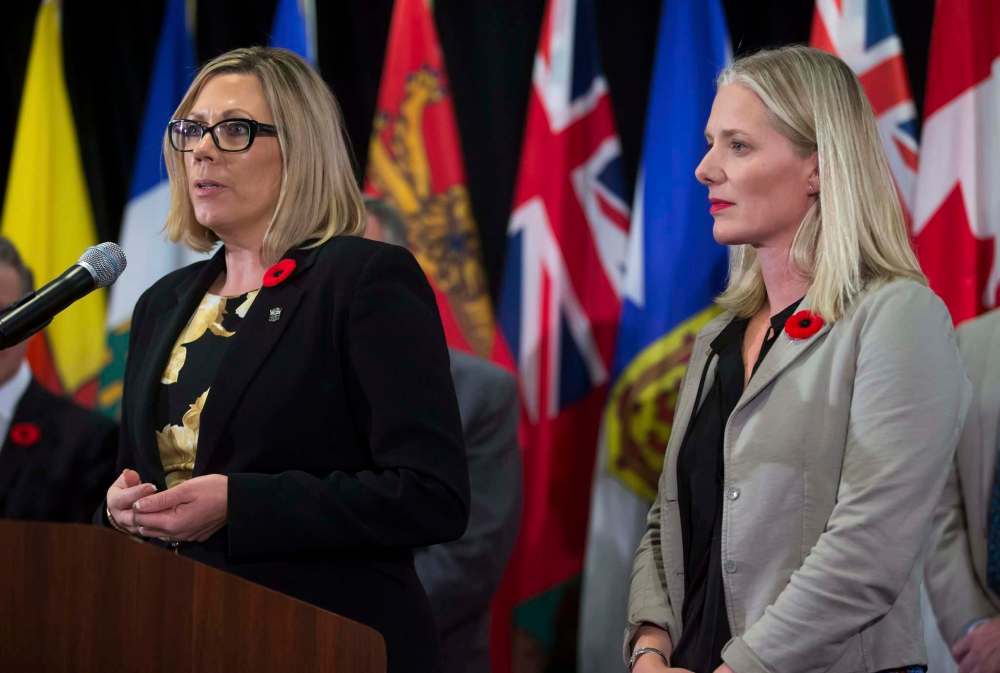Ottawa issues $66-M ultimatum to province
Sign on to climate deal or lose funding
Advertisement
Read this article for free:
or
Already have an account? Log in here »
To continue reading, please subscribe:
Monthly Digital Subscription
$1 per week for 24 weeks*
- Enjoy unlimited reading on winnipegfreepress.com
- Read the E-Edition, our digital replica newspaper
- Access News Break, our award-winning app
- Play interactive puzzles
*Billed as $4.00 plus GST every four weeks. After 24 weeks, price increases to the regular rate of $19.95 plus GST every four weeks. Offer available to new and qualified returning subscribers only. Cancel any time.
Monthly Digital Subscription
$4.99/week*
- Enjoy unlimited reading on winnipegfreepress.com
- Read the E-Edition, our digital replica newspaper
- Access News Break, our award-winning app
- Play interactive puzzles
*Billed as $19.95 plus GST every four weeks. Cancel any time.
To continue reading, please subscribe:
Add Free Press access to your Brandon Sun subscription for only an additional
$1 for the first 4 weeks*
*Your next subscription payment will increase by $1.00 and you will be charged $16.99 plus GST for four weeks. After four weeks, your payment will increase to $23.99 plus GST every four weeks.
Read unlimited articles for free today:
or
Already have an account? Log in here »
Hey there, time traveller!
This article was published 21/12/2017 (2988 days ago), so information in it may no longer be current.
OTTAWA — The federal government has given Manitoba a deadline of late February to endorse Ottawa’s general climate change principles, or risk losing an estimated $66 million in funding for low-carbon retrofits, the Free Press has learned.
Environment Canada confirmed Manitoba will lose its share of the $2-billion fund if it doesn’t ratify the Pan-Canadian Framework on Clean Growth and Climate Change by Feb. 28.
The department confirmed Wednesday that federal Environment Minister Catherine McKenna set the deadline in a recent letter to her provincial counterpart, Rochelle Squires. Neither the department nor Squires’ office would provide the letter, citing confidentiality.

It’s the latest escalation in a 12-month standoff, throughout which only Manitoba and Saskatchewan have refused to endorse the framework.
Squires said Tuesday she’d be open to supporting the framework if Ottawa moves forward “without prescribing a carbon-tax level” on Manitoba. The federal Liberals have repeatedly said the two are not linked.
The money falls under the Low Carbon Economy Fund, which is to be used for projects that make buildings more energy efficient, and store or capture carbon during agricultural processes.
Each province and territory that endorses the framework will receive a baseline of $30 million, plus an amount based on population.
Officials said Wednesday Manitoba would be allocated roughly $66 million.
Roughly three-quarters of the $2-billion fund will go to provinces and territories. The rest will go to projects, which Indigenous, not-for-profit and business groups can apply for, as well as provincial and municipal governments, if their ideas meet the goals of the fund.
Environment Canada said Wednesday if Manitoba or Saskatchewan doesn’t join the framework, the funding allocated for them 12 months ago will be moved to the challenge fund.
In October, Manitoba Premier Brian Pallister proposed a carbon tax that falls short of Ottawa’s 2022 target of $50 per tonne of carbon. The Manitoba plan sets a flat $25 levy, meaning it only complies with escalating federal benchmarks for the first 2.5 years.
On Monday, Squires said Manitoba won’t be able to get the funding because agreeing to the framework would compel it to reach the $50 target.
Environment Canada officials said Wednesday there’s no framework document that must be signed, but rather, provinces must endorse a set of principles — including the need for carbon pricing — without any set targets. They noted when the other 11 provinces and territories ratified the framework last December, none of them had a 2022 plan in place.
The high-ranking officials, who asked not to be named, said Manitoba has been diligently reporting its climate plans, despite not ratifying the framework. They said once Manitoba does so, they’ll co-author a statement outlining how the province intends to help the federal government reach its 2030 emissions-reduction target, as other provinces have done.
On Wednesday, Squires repeated the province’s claim that its plan will achieve greater emissions reductions than Ottawa’s targets, citing scientific modelling used by Environment Canada.
“Cumulative emissions are projected to drop by more than one megatonne — 80,000 tonnes more than with the federal carbon tax,” in five years, Squires wrote in an email.
“We look forward to opportunities to discuss with the federal government how the made-in-Manitoba climate and green plan will meet their climate objectives and exceed the emissions goals of the Pan-Canadian framework.”
Meanwhile, McKenna made public Wednesday deadlines for when provinces’ carbon levies must kick in.
She has asked the regions to implement a minimum tax of $10 per tonne by Dec. 31, 2018, but only compels them to have a levy by the next day, at $20, before escalating by $10 each year until reaching $50 in 2022.
Provinces have until either March 30 to confirm they’re following a federal tax system, or Sept. 1 to announce their own plans, such as Ontario’s cap-and-trade model or the British Columbia tax.
McKenna wouldn’t say Wednesday whether her department has worked hard enough over the past year to get Manitoba on board, nor whether she feels Manitoba had a right to complain about its funding being in limbo.
“We will be evaluating each system. We have a backstop, and they need to meet the backstop. But we’re encouraged that the (Manitoba) government announced that they are putting a price on pollution. That is the key,” she said.
dylan.robertson@freepress.mb.ca


